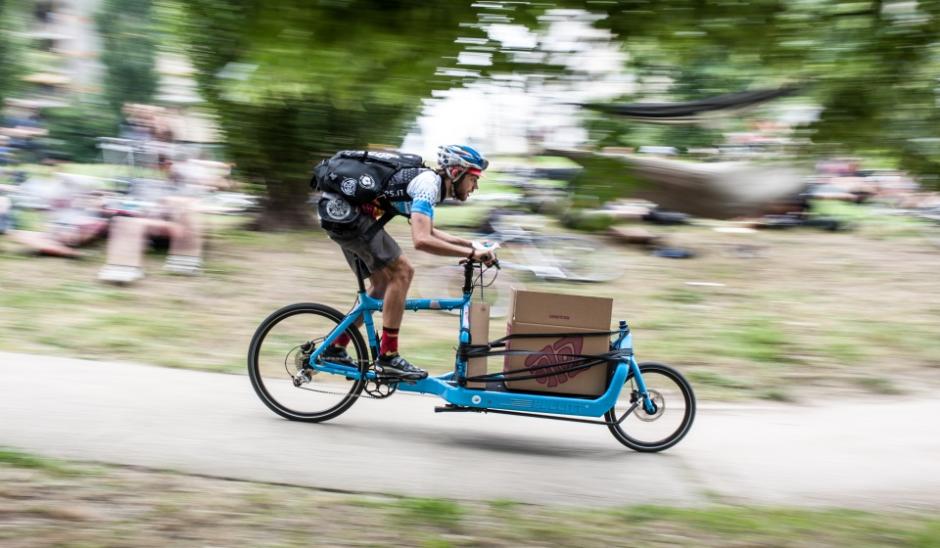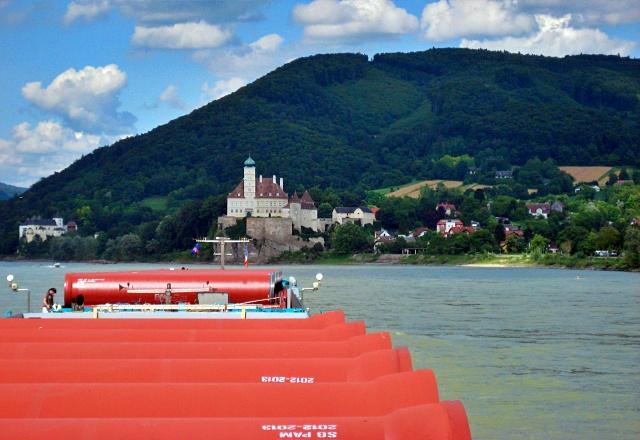Materials transport: on the road to sustainability
The figures speak for themselves: road freight transport is responsible for 16% of global CO2 emissions(1). As the world seeks to cope with the climate emergency, new sustainable solutions are emerging: rail, car sharing, river barges or bicycles... We take a closer look at the latest developments.


Smarter, more sustainable transport

To transport 5,000 tons of goods, you need 250 trucks each loaded with 20 tons, 125 rail wagons or just 1 river barge!
Did you know?
Every year, the materials we use to build our homes, all the things they contain, and almost all the products we buy and use travel hundreds or even thousands of miles by road to reach our doorsteps. And with 4 million miles of roads in the USA, 870,000 in Canada, 684,000 in Japan and France, 39,000 in Germany and 280,000 in Italy, the world’s developed countries are looking rather like endless trading highways.
But how else can we transport less or transport better so that we can minimize our carbon footprint? The answer, quite simply, is by encouraging new, more efficient alternative means of delivering the goods we need. Initiatives in this direction certainly lack nothing in terms of originality, and could actually revolutionize the transport industry going forward.
Goods: a long tranquil river
With its new branch on the quayside at Port de Javel on the Seine in Paris (France), French builders merchants POINT.P is backing river transport. Its 2 barges Andromeda and Freedom carry materials and supplies to company branches, and collect returnable pallets and recovered construction site waste on their return trips. An increasingly popular solution with companies, river transport seems to have a bright future ahead. Less polluting, more flexible and more cost-effective, river transport currently takes 1 million truck journeys off the roads of the Paris region alone every year, avoiding the emission of 200,000 tonnes of CO2.
"Green" fuels and hydrogen-powered trains
Electric fleets, "green" fuels and hybrid vehicles offer another popular alternative for major manufacturers and contractors. The POINT.P chain – Yes, them again! – now operates so-called ‘virtuous’ trucks, because 46% of its fleet will be running on VNG (vehicle natural gas) by the end of this year. So what advantages does liquefied natural gas offer? Well, it produces up to 95% less Sulphur and oxide particulates, and around 80% less nitrous oxide.
This alternative to diesel has already been introduced by other Saint-Gobain Group companies in Europe, including the Spanish building materials distributor Distriplac, whose fleet now includes its first ‘clean’ HGV. In Norway, materials distributor Optimera is also keeping up its efforts to make the transition to sustainable transport: 60 of its mobile cranes have already been fitted with Euro 6-compliant low-emission engines. What makes them better? A significant reduction in NOx (nitrogen-based pollutants) and particulate emissions. The Norwegian subsidiary also has a truck powered by batteries and biofuels to offer emission-free deliveries that also significantly reduce noise pollution for its neighbors!
Soft pedal!
River transport and virtuous truck fleets both offer real alternatives that help to relieve road congestion and limit polluting emissions, but there are other solutions that pedal hard for the climate: bikes! Whether we like it or not, we have to admit that sometimes it’s impossible to do without road transport! And where that’s the case, we must look to softer transport solutions or develop cutting-edge answers for city center deliveries.
Today, urgently needed products can be delivered to construction sites within the hour using the bike courier service offered by la Plateforme du Bâtiment. Hugely popular with tradesmen and local retailers, electrically-assisted cargo bikes are increasingly popular for making green final mile deliveries.
Truck sharing to reduce every kind of cost
The world’s major cities are trying hard to relieve congestion on their streets and restrict city center access for trucks. That’s the case in Amsterdam, where the transition is being supported by a new company called LeanWorks. This Saint-Gobain Group subsidiary in the Netherlands is providing sustainable delivery solutions through vehicle sharing! Actually, it’s all about truck sharing... But how? Well, materials from different suppliers are carried on a single shared truck, delivered on the basis of a shared schedule, and all the associated waste is recovered for the return journey.
It’s an effective solution not only in terms of CO2 emissions, but also for recycling and reduced transport costs. That’s important, because road transport is expensive and consumes a lot of fuel. Too much.
PAM’s Russian dolls
So to cut costs at the same time as shrinking its carbon footprint, Saint-Gobain PAM has devised a clever solution the transporting its ductile iron pipes, whose diameter can reach some very impressive sizes. How? Simply by fitting the smaller diameter pipes inside the largest diameter pipe: this ‘telescoping system’ works just like the famous Russian doll! The result is that transport space is optimized by using this system known as PAM, thereby reducing the number of trucks on the road (256 fewer vehicles, actually) and therefore overall environmental impact. It also cuts transport costs by a very helpful 40%.
Transporting consumer materials and products is increasingly becoming the focus for initiatives that are as smart as they are sustainable. New solutions are already being studied, including hydrogen-powered freight trains (similar trains are already carrying passengers in Germany) and the electric cargo ships that will carry tomorrow's freight containers with almost zero emissions! Yet another step towards sustainable transport...
(1) What is the current trend in greenhouse gas emissions? By Jean-Marc Jancovici
Photo credits: Saint-Gobain, Saint-Gobain PAM, DR, Shutterstock
The latest stories
All stories
View more



